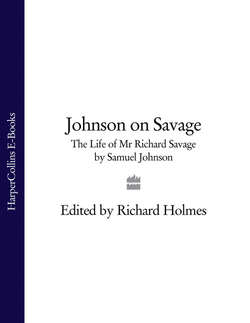Читать книгу Johnson on Savage: The Life of Mr Richard Savage by Samuel Johnson - Samuel Johnson - Страница 11
7
ОглавлениеIn the final section of the biography, Johnson makes a last brilliant adjustment to the tone and angle of his narrative. It is clear that he disapproves of Savage’s delusory scheme to ‘retire’ into rural Wales, and live off the subscription organized by Pope, until he has re-written his failed play Sir Thomas Overbury. But his account is subtly and sympathetically pitched. It begins in a gentle satire of Savage’s dreamlike ideas of country life, ‘of which he had no knowledge but from pastorals and songs’, and where he fondly imagined that ‘the melody of the nightingale’ was to be heard ‘from every bramble’. This seems unavoidably like the echo of an actual conversation they had. (p.82) But it ends in the bleak reporting of a nightmare, with Savage ill, penniless and friendless in Bristol, sleeping in the garret of an ‘obscure inn’ by day (probably drunk); and slipping out by night - again that theme of obsessive night-walking - only to avoid creditors and restore ‘the action of his stomach by a cordial.’ (p.90).
Yet once in the debtor’s prison, Johnson tenderly shows many of Savage’s strongest qualities reasserting themselves: his wit, his stoicism, his inexhaustible interest in those around him (even the lowest inmates working in the prison kitchens). His seductive charm also seems miraculously sustained, and Johnson gravely reports how Savage makes a final conquest of his kindly gaoler, Mr Able Dagge. We may be sure that Mr Dagge also came to believe he was ‘the son of the late Earl Rivers’.
In a surprising and effective move, Johnson for the first time uses long quotations from three of Savage’s own letters to bring us most closely into his company. This is the section that Johnson re-wrote all night in January 1744 against his publisher’s deadline, and shows how the prospect of immanent execution - as he later remarked in another context - wonderfully concentrates the writer’s mind.
The first of these letters is to a Bristol friend, Saunders; the last evidently to his publisher, the faithful Edward Cave; the middle one is anonymous, ‘to one of his friends in London’. In each we hear Savage’s own voice, and experience his fantastic and violent shifts of mood - resignation, followed by fury, pride, bitterness, insouciance, despair, charm, enigmatic mystery. The changes are so volatile, so swift and so extreme, that one might almost think one was witnessing actual changes in Savage’s personality—or identity. No doubt Johnson intended his readers to reflect on the psychological implications of that too.
It is possible that the confidential and touching middle letter, to the unnamed ‘friend in London’, was actually to Johnson himself. It has a stoic piety that Johnson would have admired. It also seems to make an unmistakable, rueful, smiling reference to their previous argument about the charms of rural life, and the amiable delusion of birds singing from every bramble.
Typically, Savage finds a delightful way of proving that young Johnson was wrong, and that he - Savage - was telling the truth all along. ‘I thank the Almighty, I am now all collected in myself; and, though my person is in Confinement, my mind can expatiate on ample and useful subjects with all the freedom imaginable. I am now more conversant with the Nine than ever, and if, instead of a Newgate-bird, I am allowed to be a bird of the Muses, I assure you, Sir, I sing very freely in my Cage; sometimes, indeed, in the plaintive notes of the Nightingale; but at others in the cheerful strains of the Lark.’ (p.95)
The end, when it comes, is swift but enigmatic. The dying Savage has one more secret to impart, but moving his hand ‘in a melancholy manner’, fails to tell it to his kindly gaoler - or to his attentive biographer. Johnson’s elegant summary of Savage’s extraordinary mixture of vices and virtues maintains its tender, ironic balance to the last. Although, not quite to the last. The final appeal is made directly to the reader’s sympathy, to his heart, in what became Johnson’s most celebrated biographical peroration. ‘For his life, or for his writings, none who candidly consider his fortune, will think an apology either necessary or difficult…Those are no proper judges of his conduct, who have slumbered away their time on the down of plenty; nor will any wise man presume to say, “Had I been in Savage’s condition, I should have lived or written better than Savage.”’ (p.105)
There is in fact one more paragraph, which concludes with a more severe and conventional verdict, bringing the two words ‘genius’ and ‘contemptible’ into irreconcilable contact. But against this, Savage’s friend and advocate later wrote dismissively in the margin of his own 1748 copy: ‘Added’.
